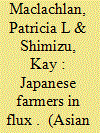| Srl | Item |
| 1 |
ID:
070523


|
|
|
| 2 |
ID:
145683


|
|
|
|
|
| Summary/Abstract |
The politics of Japanese agricultural reform is rapidly changing. Once dependent on foreign pressure, reform is now fueled by a deepening farm crisis and a breakdown in postwar political alignments. Focusing on the Abe government’s reform of Japan Agricultural Cooperatives, we explore Japan’s expanding capacity for executive leadership in the farm sector on behalf of market-oriented change.
|
|
|
|
|
|
|
|
|
|
|
|
|
|
|
|
| 3 |
ID:
171721


|
|
|
|
|
| Summary/Abstract |
This article analyzes agricultural reform as an element of broader shifts in the Japanese welfare regime. In postwar Japan, agricultural support and protection served as a "functional equivalent" to welfare provision in rural and semi-rural areas. However, an ongoing agricultural reform process has put pressure on aging smallholders and on JA, the powerful organization of agricultural cooperatives. This article investigates how these local actors have responded to an increasingly hostile socio-economic and political environment. To address this question, the article focuses on hamlet-based collective farming, which is a form of agricultural production that can reproduce the welfare character of the postwar support and protection regime on the local level. Based on field research in several rural and semi-rural communities, the article argues that the functions and the local proliferation of hamlet-based farming are shaped by village institutions: hamlet-level norms and rules governing land use and agricultural cooperation, as well as social ties between hamlets, local co-ops, and local governments. While the integration of village institutions into local cooperative and administrative structures can support a systematic local proliferation of collective farming, municipal and cooperative mergers have rendered such comprehensive local responses more complicated. More generally, the article proposes to investigate local acts of recombining community ties and norms with changing macro policies as a promising analytical angle to understand the ongoing renegotiation of East Asian welfare regimes.
|
|
|
|
|
|
|
|
|
|
|
|
|
|
|
|
| 4 |
ID:
030539


|
|
|
|
|
| Publication |
California, Goodyear, 1972.
|
| Description |
xiv, 305p.pbk
|
| Standard Number |
0876206194
|
|
|
|
|
|
|
|
|
|
|
|
Copies: C:1/I:0,R:0,Q:0
Circulation
| Accession# | Call# | Current Location | Status | Policy | Location |
| 010137 | 951.05/CHA 010137 | Main | On Shelf | General | |
|
|
|
|
| 5 |
ID:
161263


|
|
|
|
|
| Summary/Abstract |
This article studies Chinese central government policies in relation to food market building and food security between 1979 and 2008. It investigates major changes in the state's grain purchase pricing, urban subsidized food sales and the state monopoly over rural-to-urban food circulation that were effected in an attempt to ensure both food availability and accessibility under fiscal constraint. By observing the gradual transition from state monopoly to the market, this article traces the mechanisms which enabled the Chinese government to both establish a monopsony by generating artificial price signals for farmers to generate food output, and act as a monopolistic seller by providing subsidized low-priced food to urban consumers in order to fulfil its goal of low-cost industrialization. Thus, China's food security largely hinged on the government's budget to subsidize the price gap. The Chinese government juggled between food security and fiscal affordability to formulate a food budget that would neither excessively impact food security nor cause a crisis to government finance. China's food security puzzle was eventually worked out in the mid-2000s with the boosting of national income, which enhanced the population's access to food and eased the central government's food security concerns.
|
|
|
|
|
|
|
|
|
|
|
|
|
|
|
|
| 6 |
ID:
089561


|
|
|
|
|
| Publication |
2009.
|
| Summary/Abstract |
The dramatic transition from Communism to market economies across Asia and Europe started in the Chinese countryside in the 1970s. Since then more than a billion of people, many of them very poor, have been affected by radical reforms in agriculture. However, there are enormous differences in the reform strategies that countries have chosen. This paper presents a set of arguments to explain why countries have chosen different reform policies.
|
|
|
|
|
|
|
|
|
|
|
|
|
|
|
|